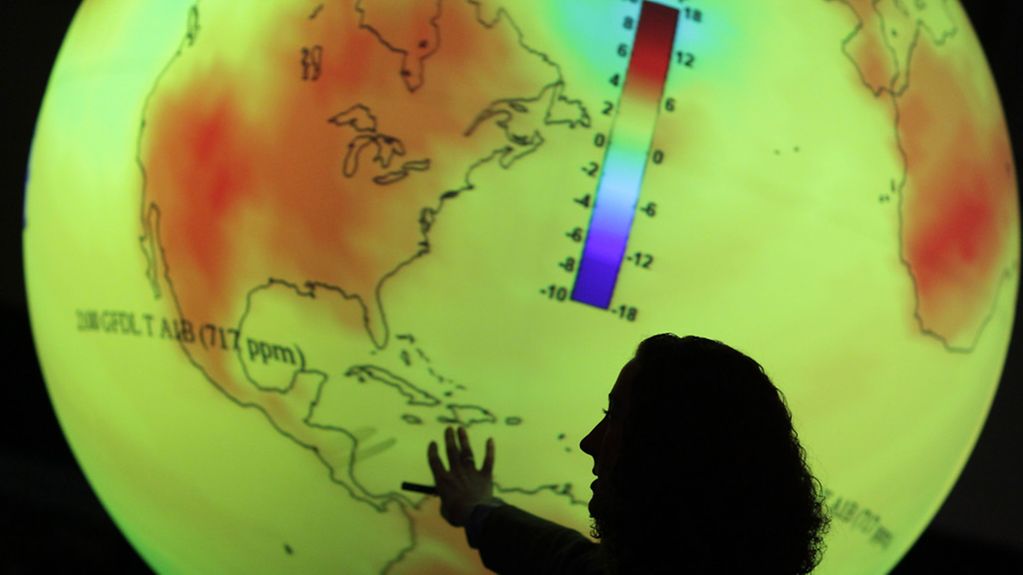IPCC Fifth Assessment Report
The Intergovernmental Panel on Climate Change, IPCC, has called on the international community to speed up their actions in the fight against climate change. The target of keeping the rise in global temperatures down to 2°C is still achievable, says the IPCC.
3 min reading time

Capping global warming - the Intergovernment Panel on Climate Change presents its Fifth Assessment Report
Photo: picture alliance / dpa
Federal Environment Minister Barbara Hendricks described the Fifth Assessment Report as alarming, yet encouraging.
Global emissions of carbon dioxide caused by the combustion of fossil fuels must drop – by 40 to 70 per cent by 2070. By the turn of the century in 2100, CO2 emissions from fossil fuels must be ended completely. The only way to keep global warming down to 2°C is to pursue a policy as rigorous as this, states the IPCC in its Fifth Assessment Report.
International cooperation indispensable
“We are well aware of the dramatic consequences of climate change for human beings and the natural environment, but we are also familiar with the tools for mitigating climate change,” declared Federal Environment Minister Barbara Hendricks in Berlin. The international community must now do everything in its power to reach an ambitious climate agreement in Paris in 2015.
Federal Research Minister Johanna Wanka and Federal Environment Minister Barbara Hendricks see Germany playing a key role in efforts to tackle climate change. The Federal Republic of Germany is not only a global leader in relevant research and in the development of principles, strategies and possible solutions.
The energy transformation Germany is pursuing at home also makes it a practical role model in the use of technologies that could help mitigate climate change around the world. “Germany can play an important part at international level if we demonstrate that climate change mitigation works in an industrialised country,” declared Barbara Hendricks.
Further reducing CO2 emissions
In the fight against climate change, the German government intends to close down coal-fired power plants too. “There is no alternative to scaling back our use of coal-fired power plants,” said Barbara Hendricks. This will have to take into account the difficult situation in which power utilities currently find themselves, as well as the job situation.
“We still have a choice between 2°C and 4°C depending on whether we now pursue good or bad climate policies,” said Otmar Edenhofer, Chief Economist of the Potsdam Institute for Climate Impact Research. “If we stop subsidising coal mining that would in itself go a long way to mitigating climate change.”
By 2020 the German government aims to achieve its target of reducing CO2 emissions by 40 per cent as compared to 1990 levels. The measures adopted to date should bring about a reduction of about 33 per cent. Barbara Hendricks sees opportunities to cut more emissions in power generation and by overhauling buildings to improve energy efficiency.
Reforming emissions trading
Another important field for action is emissions trading. “The problem is that there are far too many emission reduction certificates on the market. The resulting prices provide no incentive to reduce emissions,” explained the Federal Environment Minister. She is working to have superfluous certificates removed from the market and placed in a reserve. “Emissions trading can then once again become an instrument in climate change mitigation,” she said.
“It is obvious that we also aim to reduce the burden on companies facing international competition, because shifting production abroad will not help the climate,” added the Minister.
The costs of climate change mitigation
“We must get moving as swiftly as possible,” said Rajendra Pachauri, Chairman of the IPCC, when he presented the IPCC’s Fifth Assessment Report in Copenhagen. The costs of not acting will be horrifically much higher than the costs of taking action, he added.
UN Secretary-General Ban Ki-moon stressed that the report debunks the myth that climate change mitigation is expensive. Indeed, it clearly demonstrates that a timely shift to alternative energy sources would be affordable. The costs of climate change mitigation would barely impact on economic growth. Given an estimated 1.6 to 3 per cent growth per annum, climate change mitigation would represent no more than 0.06 per cent.
Otmar Edenhofer explained, “We have a window of between twenty and thirty years within which climate change can be braked at an acceptable cost.” Barbara Hendricks does not intend to wait. She will be presenting an action programme on climate change mitigation for the period up to 2020 in December.